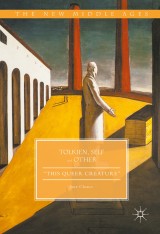Details

Tolkien, Self and Other
"This Queer Creature"The New Middle Ages
|
28,88 € |
|
| Verlag: | Palgrave Macmillan |
| Format: | |
| Veröffentl.: | 21.11.2016 |
| ISBN/EAN: | 9781137398963 |
| Sprache: | englisch |
Dieses eBook enthält ein Wasserzeichen.
Beschreibungen
This book examines key points of J. R. R. Tolkien’s life and writing career in relation to his views on humanism and feminism, particularly his sympathy for and toleration of those who are different, deemed unimportant, or marginalized—namely, the Other. Jane Chance argues such empathy derived from a variety of causes ranging from the loss of his parents during his early life to a consciousness of the injustice and violence in both World Wars. As a result of his obligation to research and publish in his field and propelled by his sense of abjection and diminution of self, Tolkien concealed aspects of the personal in relatively consistent ways in his medieval adaptations, lectures, essays, and translations, many only recently published. These scholarly writings blend with and relate to his fictional writings in various ways depending on the moment at which he began teaching, translating, or editing a specific medieval work and, simultaneously, composing a specific poem, fantasy, or fairy-story. What Tolkien read and studied from the time before and during his college days at Exeter and continued researching until he died opens a door into understanding how he uniquely interpreted and repurposed the medieval in constructing fantasy.<div><div><br><div><br></div><div><br></div></div></div>
<div>Introduction: “This Queer Creature”.- Chapter 1: Forlorn and Abject: Tolkien and His Earliest Writings (1914-1924).- Chapter 2: Bilbo as Sigurd in the Fairy-Story <i>Hobbit </i>(1920-1927).- Chapter 3: Tolkien's Fairy-Story <i>Beowulf</i>s (1926-1940s).- Chapter 4: “Queer Endings” After B<i>eowulf: The Fall of Arthur</i> (1931-1934).- Chapter 5: <i>Apartheid</i> in Tolkien: Chaucer and The Lord of the Rings, Books 1-3.- Chapter 6: “Usually Slighted”: Gudrún, Other Medieval Women, and <i>The Lord of the Rings</i>, Book 3 (1925-1943).- Chapter 7: The Failure of Masculinity: T<i>he Homecoming of Beorhtnoth</i> (1920), <i>Sir Gawain</i> (1925), and <i>The Lord of the Rings</i>, Books 3-6 (1943-1948).- Conclusion: The Ennoblement of the Humble: The History of Middle-earth.</div><div><br></div>
Jane Chance is the Andrew W. Mellon Distinguished Professor Emerita in English at Rice University, USA, and a recipient of an honorary doctorate of letters from Purdue University (2013). Author of twenty-five books and over a hundred articles and reviews, she has received Guggenheim and NEH Fellowships, among others, as well as membership at the Institute for Advanced Study at Princeton, a Rockefeller Foundation residency at Bellagio, and book and article prizes for her work.
<div>This book examines key points of J. R. R. Tolkien’s life and writing career in relation to his views on humanism and feminism, particularly his sympathy for and toleration of those who are different, deemed unimportant, or marginalized—namely, the Other. Jane Chance argues such empathy derived from a variety of causes ranging from the loss of his parents during his early life to a consciousness of the injustice and violence in both World Wars. As a result of his obligation to research and publish in his field and propelled by his sense of abjection and diminution of self, Tolkien concealed aspects of the personal in relatively consistent ways in his medieval adaptations, lectures, essays, and translations, many only recently published. These scholarly writings blend with and relate to his fictional writings in various ways depending on the moment at which he began teaching, translating, or editing a specific medieval work and, simultaneously, composing a specific poem, fantasy, orfairy-story. What Tolkien read and studied from the time before and during his college days at Exeter and continued researching until he died opens a door into understanding how he uniquely interpreted and repurposed the medieval in constructing fantasy.</div><div><br></div><div><br></div>
Combines biography, archival research, and literary analysis to paint a complicated and comprehensive picture of Tolkien Delves into a vast body of material including Tolkien's medieval adaptations, lectures, essays, and translations, many only recently published Provides a provocative and controversial angle to Tolkien’s views on humanism and feminism.
<p>“This book is Jane Chance’s best work to date—and that’s saying a lot for a scholar whose research has been key to the field of Tolkien studies for more than four decades. Chance has shaken up all the pieces that Tolkien scholars have been playing with for so long and put them back together in a pattern so obvious and seamlessly connected that the rest of us must gape both excited and humbled.” (Leslie A. Donovan, editor of “Approaches to Teaching Tolkien’s<i> </i>The Lord of the Rings and<i> </i>Other Works” and “Perilous and Fair: Women in the Works and Life of J. R. R. Tolkien”<i>)</i></p>
<p>“What is important about this book is Jane Chance's vigorous positioning of Tolkien as Other, as a lifelong outsider and of the profound effect this had on his fiction. It is an essential point, and Chance has stated it loud and clear and right at the beginning.” (Verlyn Flieger, author of “Splintered Light”, “A Question of Time”, and “Green Suns and Faërie”)</p>
<p>“A rousing reevaluation of Tolkien...Chance slays the bugaboos of banal readings, shifting long-lived views of the author and his creatures that we only thought we knew.” (Tison Pugh, author of “Queering Medieval Genres”)<br></p>
<p>“What is important about this book is Jane Chance's vigorous positioning of Tolkien as Other, as a lifelong outsider and of the profound effect this had on his fiction. It is an essential point, and Chance has stated it loud and clear and right at the beginning.” (Verlyn Flieger, author of “Splintered Light”, “A Question of Time”, and “Green Suns and Faërie”)</p>
<p>“A rousing reevaluation of Tolkien...Chance slays the bugaboos of banal readings, shifting long-lived views of the author and his creatures that we only thought we knew.” (Tison Pugh, author of “Queering Medieval Genres”)<br></p>
Diese Produkte könnten Sie auch interessieren:

The Enigma of Good and Evil: The Moral Sentiment in Literature

von: Anna-Teresa Tymieniecka

309,23 €















